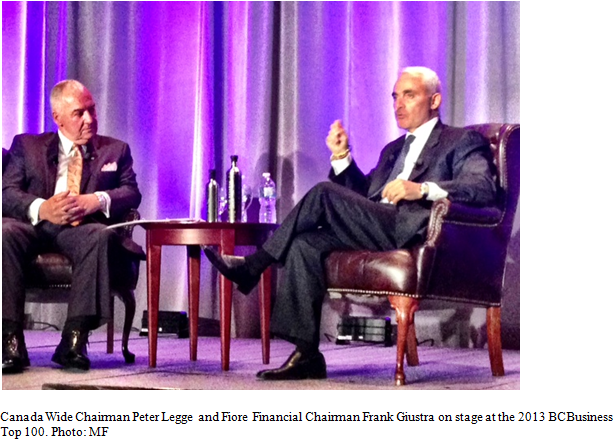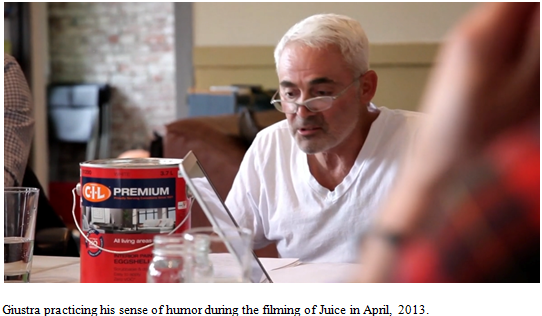Yesterday I had another opportunity to hear Frank Giustra speak — this time at
BCBusiness Magazine’s Top 100 event at Hotel Vancouver. In front of a crowd of 1,200, he was interviewed on stage by BCBusiness chairman
Peter Legge.

Frank Giustra became a millionaire in his early 20s financing small mining and energy companies. As Chairman and CEO, he went on to build Yorkton Securities into an industry dominator. But at the height of the mid-90s gold bull market, Giustra quit, only to quickly re-emerge as the founder of Lionsgate Entertainment, which is the world’s largest independent film studio today. In 2001, Giustra returned to the commodities world– this time as Chairman of Endeavour Financial. From here, he launched countless resource companies, including what is now Goldcorp, Silver Wheaton, Uranium One, Pacific Rubiales Energy, and others. In 2010, he got into the food sector with Domenica Fiore, now recognized as the world’s best medium blend olive oil.
To say Giustra has the Midas touch is an understatement.
Giustra frequently travels the world with philanthropy pal Bill Clinton aboard his massive luxury jet (sleeps 18). The two men established what is now the
Clinton Giustra Enterprise Initiative with over $100 million of Giustra’s own money in 2007, and another $100 million coming in from Carlos Slim, who is literally the world’s richest man.
We have been fortunate enough to
travel with Mr. Giustra, and consider him a friend. He invited us to sit in the second row at BCBusiness’s event yesterday. Here we had the privilege of watching Peter Legge try to wrestle unique insights out of Guistra for over an hour. It turned out to be pretty damn good.
“If you have nothing to lose, go for it,” Guistra told the audience. Before deciding to work in the stock market, Frank wanted to be a grocery store manager. But he quickly expanded his ambitions, and soon after, graduated from making $600 a month as a clerk at Super Value to earning $80,000 in his first year as a broker. “I’ll be the best broker you ever had,” he said during his first job interview — which he landed at age 20.
A stand-out moment of the interview described Giustra detailing how humbled he became as the new CEO of Lionsgate Entertainment; several times in the late 90s, the film company nearly went bankrupt. One winter’s day in Toronto, Guistra explained, he accidentally dropped a stack of Lionsgate brochures into the snow. Looking down, he was suddenly struck by a “Holy shit, what the hell am I doing with my life?” moment. He had been a somebody at Yorkton — people would come to him to get their business plans financed. But here he was, digging a stack of brochures for a fledgling company out of a pile of dirty snow. But Giustra eventually managed to secure the management team that helped grow the company to what it is today. “I couldn’t let it go bust,” Giustra said, betraying to his own pride in the endeavour. Since then, his determination has paid off for Lionsgate. It’s now worth approximately $4 billion.
“
On several occasions I’ve felt that I’ve deprived some village out there of an idiot,” Guistra told the audience to laughter, describing the first of his three rules for hiring senior executives: hire individuals smarter than you are. The second trait he makes heavy trade-offs for is personality and a winning attitude. Finally, a sense of humor. “
If you have a sense of humor you can get through almost any situation,” he told us.

Giustra described his meetings with famed Spaghetti Western film producer Sergio Leone during the late 1980s, attempting to get Leone to make a movie with him. During their final meeting in Rome, Leone agreed to make the film, only to die the next day of a heart attack.
Giustra has come a long way from his modest beginnings in Aldergrove, B.C. To everyone’s surprise, he pointed out his father Joe in the audience. Joe was a humble miner, and taught his son to never to borrow money, which Giustra swears he never does. He quickly apologized to Great Western Bank for the comment, the event’s sponsor.
“He’s a man, he has his moods, but his heart is in the right place,” he said of former President Bill Clinton. Giustra went on to describe what it’s like to travel with the former president. “It’s a lot of ribbon cutting,” Giustra said, “but conversations with Bill are fabulous.” Clearly, Guistra is fond of the man.
“I have trouble saying no,” Giustra complained, praising billionaire Jimmy Pattison’s effectiveness in politely turning down requests for time or money. But his trouble saying no may actually be a blessing in disguise; many of his venture investments that he least expected to become successful ultimately were.
A great Giustra story that he didn’t tell at yesterday’s conference was that of his experience financing now billionaire Robert Friedland’s first big score, Diamond Fields, in 1995. An irate Friedland insisted to Giustra to “lock up” all $.10 shareholders in an early Diamond Fields financing round. Shares in the exploration company surged past $100 following an afterthought exploration effort in Newfoundland that turned up one of the world’s largest nickel deposits. “I would have sold too soon,” Giustra told me last year, thanking Friedland. Being prevented to sell his shares added substantially to Giustra’s wealth.
Interviewer Legge teased Giustra about a pledge he made to the
Globe and Mail earlier this year, saying that he would sing Patsy Cline’s “I’m so wrong” in public wearing women’s underwear if the gold price wouldn’t eventually go up. “I was practicing a few notes from that song on the car ride here today,” Giustra joked with the audience about gold’s recent tragic performance. Giustra will not sell his gold until governments around the world stop printing money, which he doesn’t see happening in the near term.
Legge pressured Giustra to reveal things about himself that the audience wouldn’t otherwise know. He writes songs and poetry, he told everyone, and also just made a short film with his friends, to try out his acting skills. Your author was lucky enough to have a brief part in the movie, taking a bullet from the gun of Giustra. Fun is one of Frank’s hallmarks.
I had hoped Giustra would tell the audience the story of how he initially financed Lionsgate with the help of a lead order from famed Canadian financier Frank Mersch, but he didn’t, so I’ll share it here. “You have no business making movies,” Mersch apparently told Giustra, “But I’ll give you the money because you’re so lucky.”
https://ceo.ca/stop-taking-yourself-so-seriously-says-tycoon-frank-giustra-bcbusiness-top100-event/